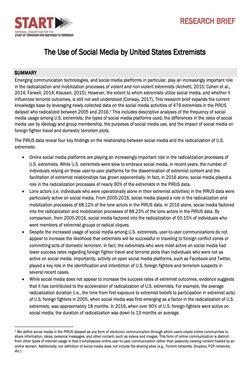By Michael Jensen, Patrick James, Gary LaFree, Aaron Safer-Lichtenstein, Elizabeth Yates
Emerging communication technologies, and social media platforms in particular, play an increasingly important role in the radicalization and mobilization processes of violent and non-violent extremists (Archetti, 2015; Cohen et al., 2014; Farwell, 2014; Klausen, 2015). However, the extent to which extremists utilize social media, and whether it influences terrorist outcomes, is still not well understood (Conway, 2017). This research brief expands the current knowledge base by leveraging newly collected data on the social media activities of 479 extremists in the PIRUS dataset who radicalized between 2005 and 2016.[1] This includes descriptive analyses of the frequency of social media usage among U.S. extremists, the types of social media platforms used, the differences in the rates of social media use by ideology and group membership, the purposes of social media use, and the impact of social media on foreign fighter travel and domestic terrorism plots.
We define social media in the PIRUS dataset as any form of electronic communication through which users create online communities to share information, ideas, personal messages, and other content, such as videos and images. This form of online communication is distinct from other types of internet usage in that it emphasizes online user-to-user communication rather than passively viewing content hosted by an online domain. Additionally, our definition of social media does not include file-sharing sites (e.g., Torrent networks, Dropbox, P2P networks, etc.).
College Park, MD: START, University of Maryland, 2018. 20p.


